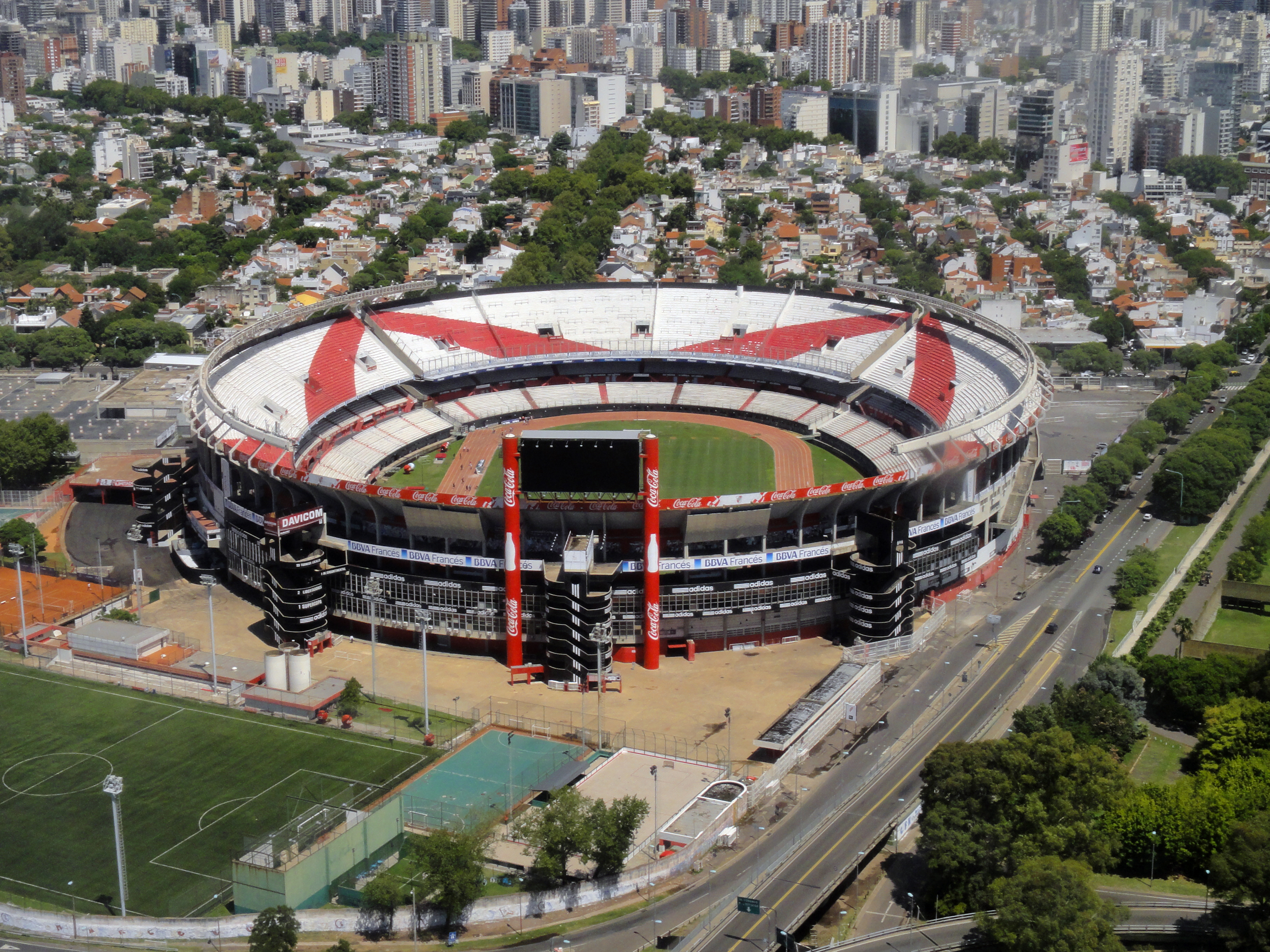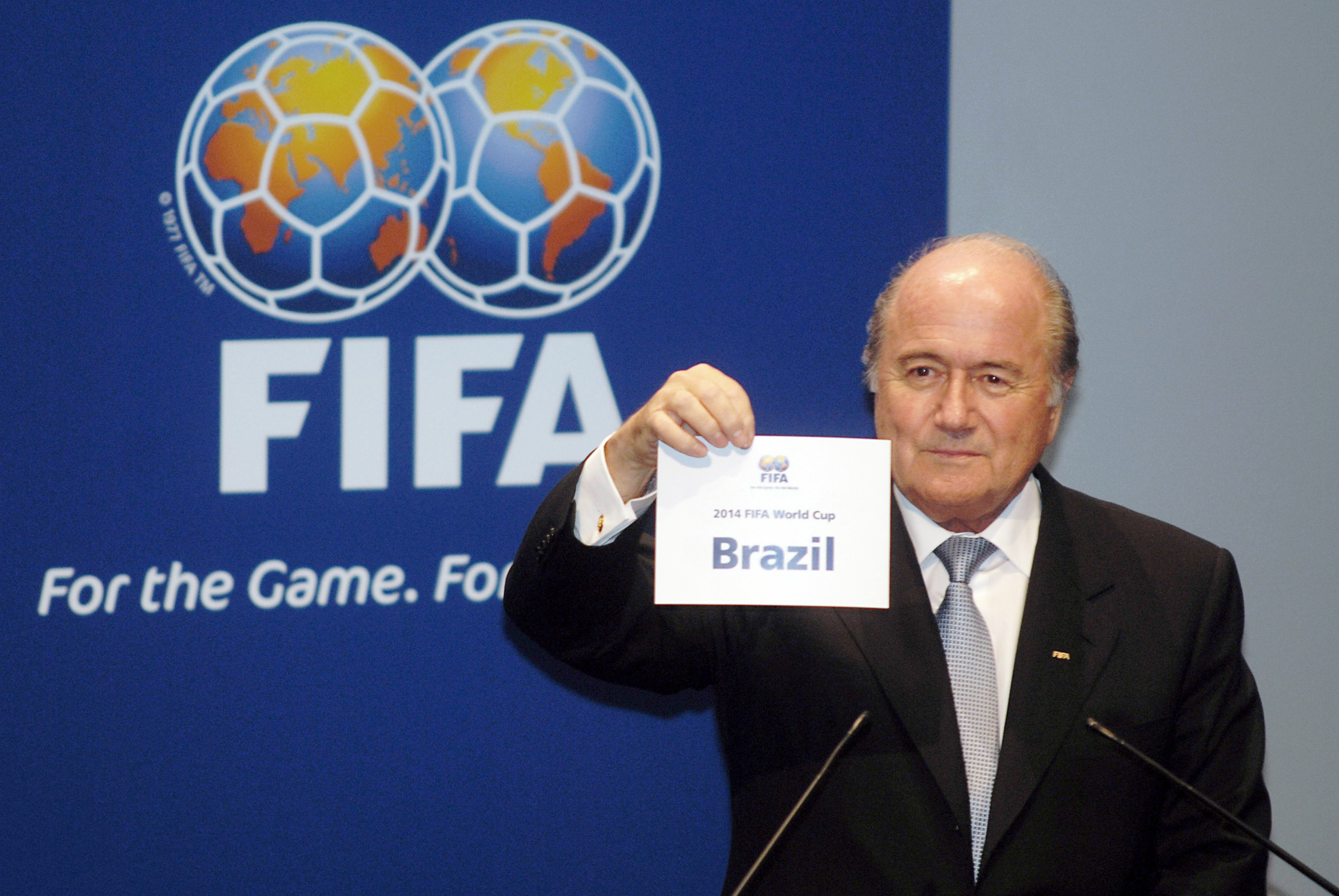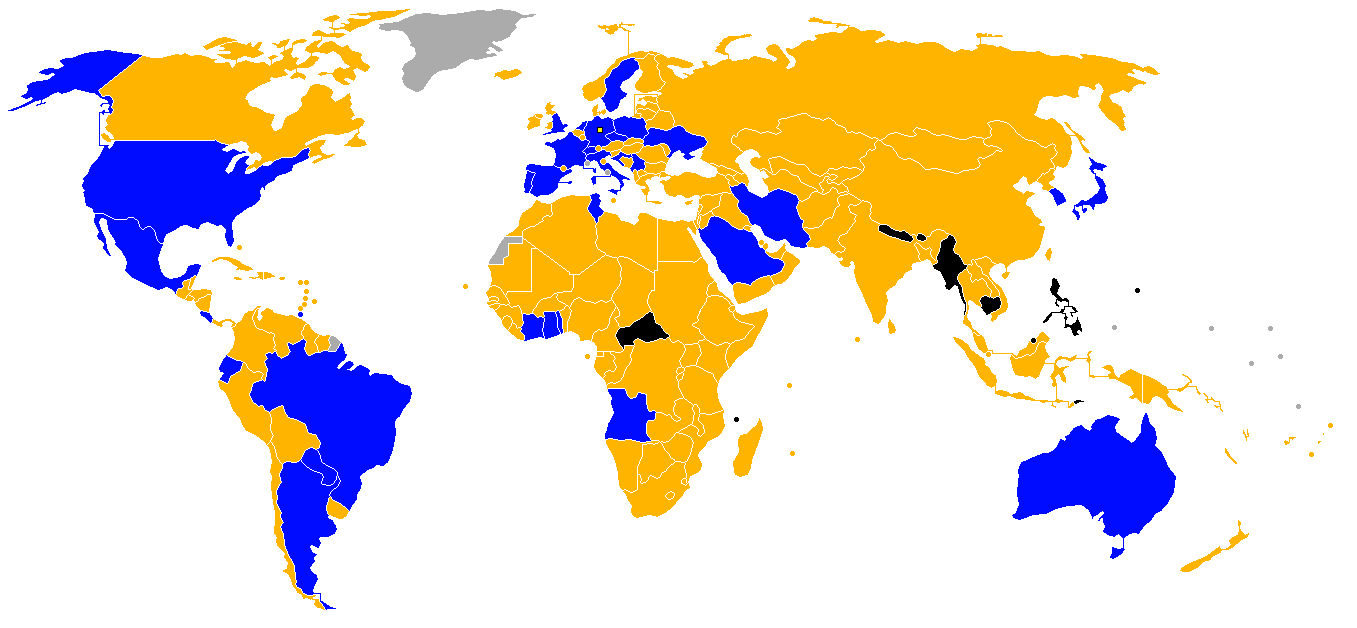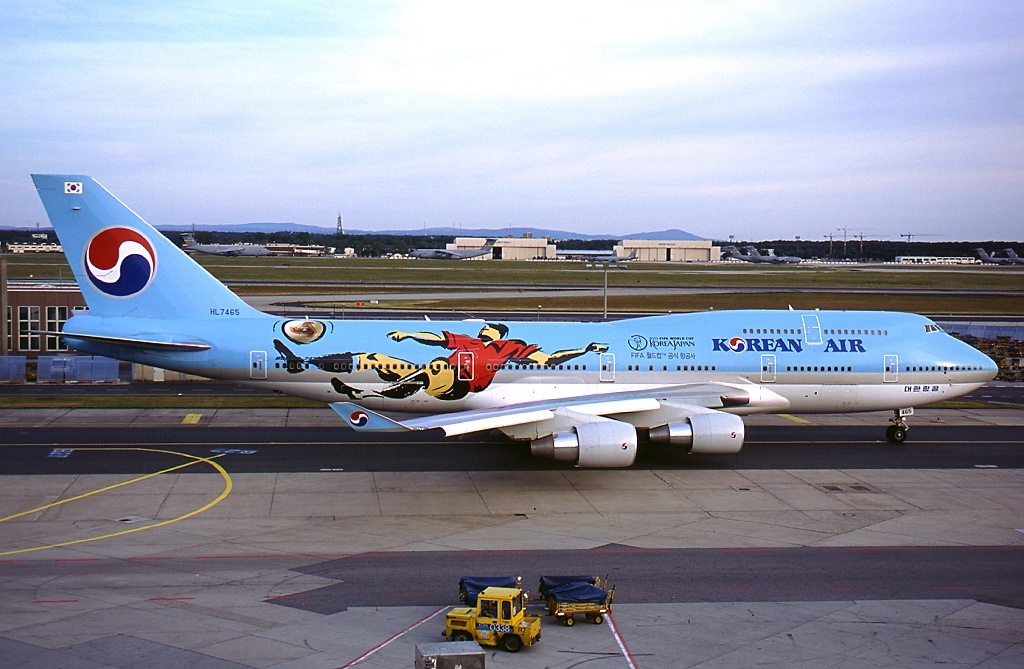|
Estadio Olímpico Atahualpa
Estadio Olímpico Atahualpa () is a multi-purpose stadium in Quito, Ecuador. It is currently used primarily for football matches and has a capacity of 35,724. Overview Built in 1951, it sits at the intersection of the Avenida 6 de Diciembre and Avenida Naciones Unidas, two major streets in Ecuador's capital city. Football clubs Deportivo Quito, El Nacional and Universidad Católica use the facility for their home games, although other prominent teams in the city have used the stadium for home games in the past. The stadium is named after the Inca Emperor Atahualpa. The stadium is located at an elevation of . At this venue, the Ecuador national team has defeated Brazil twice, Paraguay three times, and Argentina twice, amongst others, securing their positions in Korea/Japan 2002, Germany 2006, and Brazil 2014. During the qualifying for Germany 2006 and Brazil 2014, Ecuador qualified and remained undefeated at this stadium. This record was broken by Brazil in 2018 World Cup q ... [...More Info...] [...Related Items...] OR: [Wikipedia] [Google] [Baidu] |
Quito
Quito (; qu, Kitu), formally San Francisco de Quito, is the capital city, capital and largest city of Ecuador, with an estimated population of 2.8 million in its urban area. It is also the capital of the province of Pichincha Province, Pichincha. Quito is located in a valley on the eastern slopes of Pichincha Volcano, Pichincha, an active stratovolcano in the Andes, at an elevation of , making it the List of capital cities by altitude, second-highest capital city in the world.Contact Us " TAME. Retrieved on 14 March 2010. Quito is the political and cultural center of Ecuador as the country's major governmental, administrative, and cultural institutions are located within the city. The majority of transnational companies with a presence in Ecuador are headquartered there. It is also one of ... [...More Info...] [...Related Items...] OR: [Wikipedia] [Google] [Baidu] |
Argentina National Football Team
The Argentina national football team represents Argentina in men's international football and is administered by the Argentine Football Association, the governing body for football in Argentina. Nicknamed ''La Albiceleste'' ('The White and Sky Blue'), they are the reigning world champions, having won the most recent World Cup in 2022. Overall, Argentina has appeared in a World Cup final six times; a record surpassed only by Brazil and Germany; Argentina played in the first ever final in 1930, which they lost 4–2 to their South American rival Uruguay. Argentina's next final appearance came 48 years later, in 1978, when the team captained by Daniel Passarella defeated the Netherlands 3–1 in extra time, being crowned world champions for the first time. Captained by Diego Maradona, Argentina won their second World Cup eight years later, in 1986, with a 3–2 final victory over West Germany. They reached the final once more under the guidance of Maradona, in 1990, b ... [...More Info...] [...Related Items...] OR: [Wikipedia] [Google] [Baidu] |
Copa América Stadiums
Copa or COPA may refer to: COPA COPA may refer to: * Computer Operator Programming Assistant. trade of ITI * Child Online Protection Act, a former U.S. law to protect minors from certain material on the internet * Canadian Owners and Pilots Association * Cirrus Owners and Pilots Association * Parliamentary Conference of the Americas * COPA (gene), a human gene that encodes the coatomer subunit alpha protein * Controlling Profitability Analysis, Profitability Analysis (SAP) *COPA-COGECA, a union of European farmers Copa Copa may refer to: * Copa Heizung GmbH, COPA branded hydronic steel panel and bathroom radiator supplier based in Germany * Copa Airlines, an international airline based in Panama * Copa America, the main association football competition of the South American men's national football teams * ''Copa'' (spider), a genus of spiders in the family Corinnidae * Copacabana (nightclub), a nightclub in New York City * Copa Room, now-defunct Las Vegas nightclub at The S ... [...More Info...] [...Related Items...] OR: [Wikipedia] [Google] [Baidu] |
National Stadiums
Many countries have a national sport stadium, which typically serves as the primary or exclusive home for one or more of a country's national representative sports teams. The term is most often used in reference to an association football stadium. Usually, a national stadium will be in or very near a country's capital city or largest city. It is generally (but not always) the country's largest and most lavish sports venue with a rich history of hosting a major moment in sports (e.g. FIFA World Cup, Olympics, etc.). In many, but not all cases, it is also used by a local team. Many countries, including Spain and the United States, do not have a national stadium designated as such; instead matches are rotated throughout the country. The lack of a national stadium can be seen as advantageous as designating a single stadium would limit the fan base capable of realistically attending matches as well as the concern of the cost of transportation, especially in the case of the United ... [...More Info...] [...Related Items...] OR: [Wikipedia] [Google] [Baidu] |
Football Venues In Quito
Football is a family of team sports that involve, to varying degrees, kicking a ball to score a goal. Unqualified, the word ''football'' normally means the form of football that is the most popular where the word is used. Sports commonly called ''football'' include association football (known as ''soccer'' in North America and Australia); gridiron football (specifically American football or Canadian football); Australian rules football; rugby union and rugby league; and Gaelic football. These various forms of football share to varying extent common origins and are known as "football codes". There are a number of references to traditional, ancient, or prehistoric ball games played in many different parts of the world. Contemporary codes of football can be traced back to the codification of these games at English public schools during the 19th century. The expansion and cultural influence of the British Empire allowed these rules of football to spread to areas of British in ... [...More Info...] [...Related Items...] OR: [Wikipedia] [Google] [Baidu] |
Sports Venues Completed In 1951
Sport pertains to any form of competitive physical activity or game that aims to use, maintain, or improve physical ability and skills while providing enjoyment to participants and, in some cases, entertainment to spectators. Sports can, through casual or organized participation, improve participants' physical health. Hundreds of sports exist, from those between single contestants, through to those with hundreds of simultaneous participants, either in teams or competing as individuals. In certain sports such as racing, many contestants may compete, simultaneously or consecutively, with one winner; in others, the contest (a ''match'') is between two sides, each attempting to exceed the other. Some sports allow a "tie" or "draw", in which there is no single winner; others provide tie-breaking methods to ensure one winner and one loser. A number of contests may be arranged in a tournament producing a champion. Many sports leagues make an annual champion by arranging gam ... [...More Info...] [...Related Items...] OR: [Wikipedia] [Google] [Baidu] |
2018 FIFA World Cup Qualification (CONMEBOL)
The South American section of the 2018 FIFA World Cup qualification acted as qualifiers for the 2018 FIFA World Cup held in Russia, for national teams which are members of the South American Football Confederation (CONMEBOL). A total of 4.5 slots (4 direct slots and 1 inter-confederation play-off slot) in the final tournament were available for CONMEBOL teams. Two-time defending Copa América champions Chile did not qualify for 2018 FIFA World Cup after a 3–0 loss to Brazil on the final day of qualifying campaign, resulting in a sixth-place finish. As a result, following intercontinental play-offs against the record five-time OFC Nations Cup champions New Zealand, Peru qualified for the World Cup for the first time since 1982. Format The qualification structure was the same as for the previous five tournaments. The ten teams played in a league of home-and-away round-robin matches. The top four teams qualified for the 2018 FIFA World Cup, and the fifth-placed team advanced ... [...More Info...] [...Related Items...] OR: [Wikipedia] [Google] [Baidu] |
2014 FIFA World Cup Qualification (CONMEBOL)
The CONMEBOL, South American Zone of 2014 FIFA World Cup qualification saw nine teams competing for #Intercontinental play-off, 4 or 5 berths in the 2014 FIFA World Cup, finals. Brazil national football team, Brazil automatically qualified for the World Cup as the host nation so were not involved in CONMEBOL qualifying. Argentina national football team, Argentina, Colombia national football team, Colombia, Chile national football team, Chile, Ecuador national football team, Ecuador and Uruguay national football team, Uruguay advanced to the World Cup. Format The format for CONMEBOL's 2014 World Cup qualifying tournament was identical to the previous four editions. All CONMEBOL national teams played against each other twice on a home-and-away basis in a single group for 4 or 5 allotted berths. The top four teams automatically qualified for the finals. The fifth-placed team competed in the 2014 FIFA World Cup qualification (inter-confederation play-offs)#AFC v CONMEBOL, intercontine ... [...More Info...] [...Related Items...] OR: [Wikipedia] [Google] [Baidu] |
2006 FIFA World Cup Qualification (CONMEBOL)
Listed below are the dates and results for the 2006 FIFA World Cup qualification rounds for South America. 10 teams took part, all in a single group. The rules were very simple: the teams would play against each other in a home-and-away basis, with the four teams with most points qualifying to the 2006 FIFA World Cup. The fifth ranked team would have to play-off against the best team from Oceania, with the winner of this play-off also qualifying. For the first time, defending champions Brazil was required to go through the qualifying process and did not automatically qualify for the tournament. Standings *Brazil, Argentina, Ecuador and Paraguay qualified for the 2006 FIFA World Cup. *Uruguay advanced to the CONMEBOL/OFC play-off. Results Round 1 ---- ---- ---- ---- ---- Round 2 ---- ---- ---- ---- ---- Round 3 ---- ---- ---- ---- ---- Round 4 ---- ---- ---- ---- ---- Round 5 ---- ---- ---- ---- ---- Round 6 ---- ---- ---- ---- ---- Round 7 ... [...More Info...] [...Related Items...] OR: [Wikipedia] [Google] [Baidu] |
2014 FIFA World Cup
The 2014 FIFA World Cup was the 20th FIFA World Cup, the quadrennial world championship for men's national football teams organised by FIFA. It took place in Brazil from 12 June to 13 July 2014, after the country was awarded the hosting rights in 2007. It was the second time that Brazil staged the competition, the first being in 1950, and the fifth time that it was held in South America. Fans and pundits alike consider this edition of the World Cup to be one of the best ever held. 31 national teams advanced through qualification competitions to join the host nation in the final tournament (with Bosnia and Herzegovina as the only debutant). A total of 64 matches were played in 12 venues located in as many host cities across Brazil. For the first time at a World Cup finals, match officials used goal-line technology, as well as vanishing spray for free kicks. FIFA Fan Fests in each host city gathered a total of 5 million people, and the country received 1 millio ... [...More Info...] [...Related Items...] OR: [Wikipedia] [Google] [Baidu] |
2006 FIFA World Cup
The 2006 FIFA World Cup, also branded as Germany 2006, was the 18th FIFA World Cup, the quadrennial international football world championship tournament. It was held from 9 June to 9 July 2006 in Germany, which had won the right to host the event in July 2000. Teams representing 198 national football associations from all six populated continents participated in the qualification process which began in September 2003. Thirty-one teams qualified from this process along with hosts Germany for the finals tournament. It was the second time that Germany staged the competition and the first as a unified country along with the former East Germany with Leipzig as a host city (the other was in 1974 in West Germany), and the 10th time that the tournament was held in Europe. Italy won the tournament, claiming their fourth World Cup title, defeating France 5–3 in a penalty shoot-out in the final after extra time had finished in a 1–1 draw. Germany defeated Portugal 3–1 ... [...More Info...] [...Related Items...] OR: [Wikipedia] [Google] [Baidu] |
2002 FIFA World Cup
The 2002 FIFA World Cup, also branded as Korea Japan 2002, was the 17th FIFA World Cup, the quadrennial football world championship for men's national teams organized by FIFA. It was held from 31 May to 30 June 2002 at sites in South Korea and Japan, with its final match hosted by Japan at International Stadium in Yokohama. A field of 32 teams qualified for this World Cup, which was the first to be held in Asia, the first to be held outside of the Americas or Europe, as well as the first to be jointly-hosted by more than one nation. China, Ecuador, Senegal, and Slovenia made their World Cup debuts. The tournament had several upsets and surprise results, which included the defending champions France being eliminated in the group stage after earning a single point without scoring a goal and second favourites Argentina also being eliminated in the group stage. South Korea managed to reach the semi-finals, beating Poland, Portugal, Italy and Spain en route. They became the ... [...More Info...] [...Related Items...] OR: [Wikipedia] [Google] [Baidu] |







